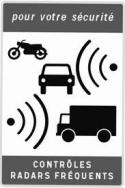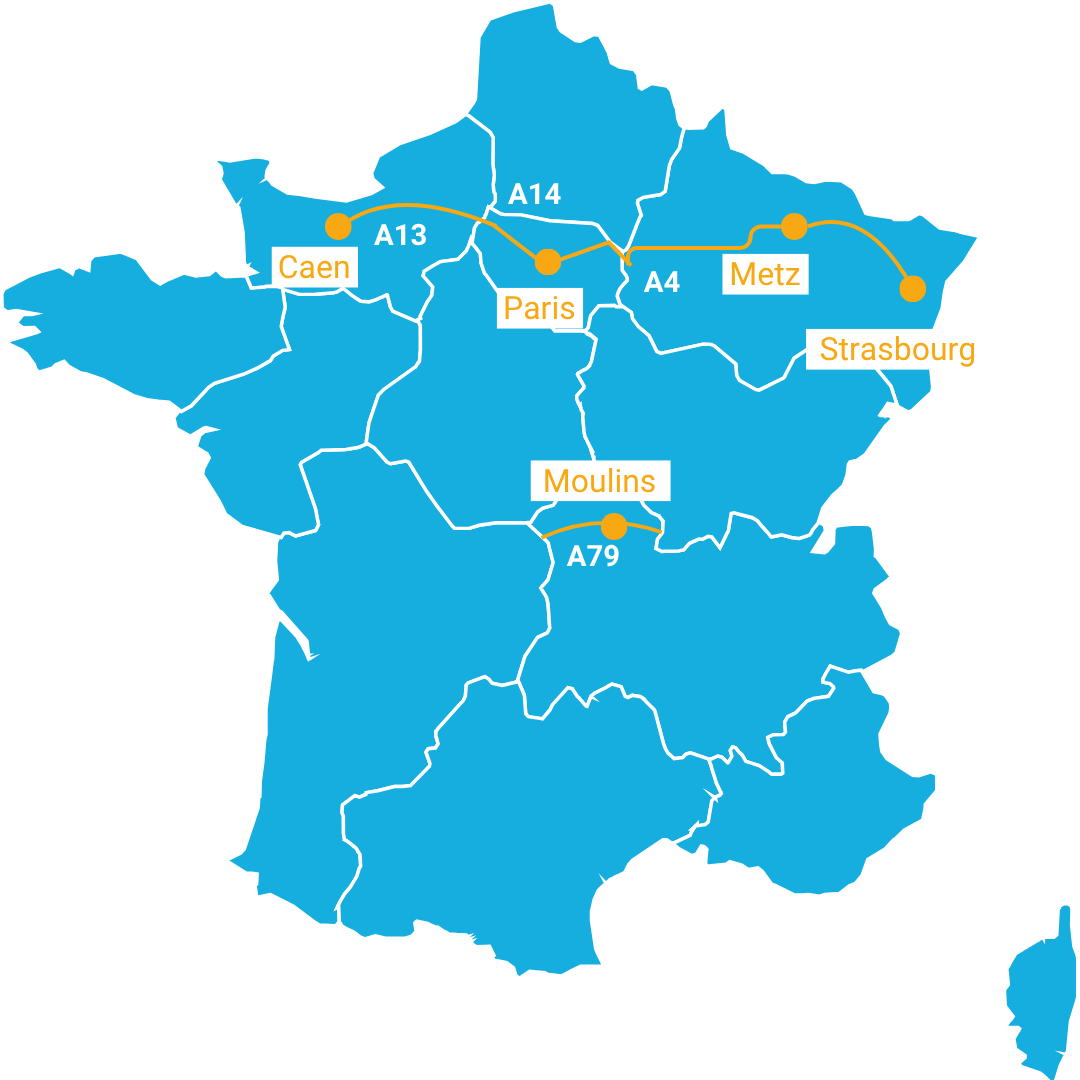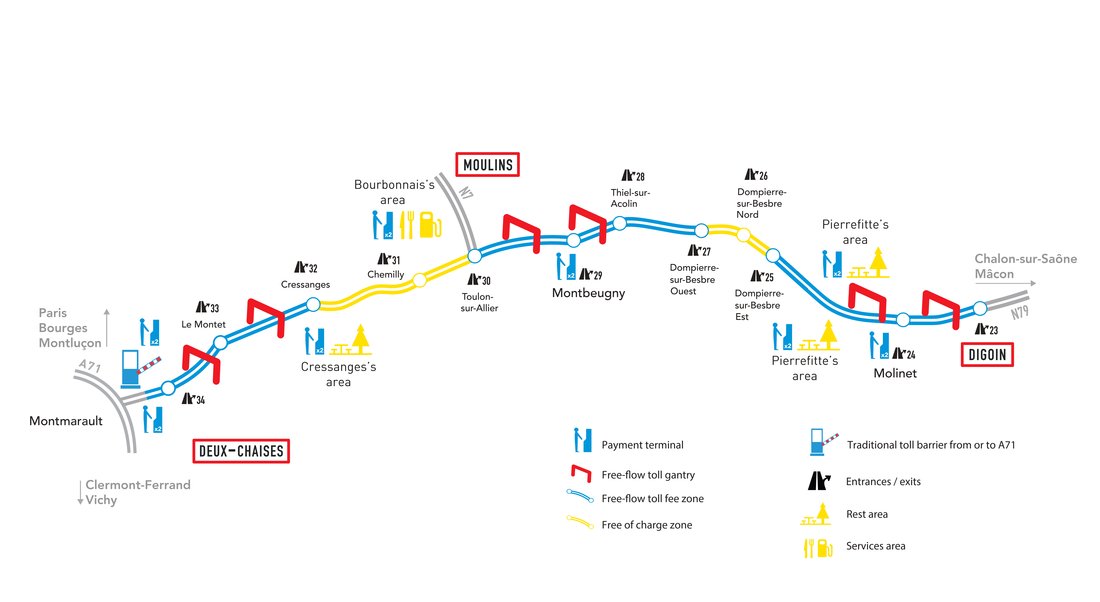Traffic offences when travelling by car in France
Speeding, unpaid tolls, unauthorised driving in environmental zones... When you travel on French roads, can you be prosecuted in your home country for an offence committed in France? What do you risk? Read all about the most frequent pitfalls of French traffic offences and their consequences in this article.
- You can be prosecuted in France
- Offences in France with a foreign permit
- Speeding in France
- Unpaid motorway tolls in France
- Pollution stickers in France
For more details about driving and traffic rules in France, for example if you travel often or plan to move to France, read our article Driving in France.
You can be prosecuted in France
Each EU country has its own traffic regulations. You must therefore follow theFrench rules when you are driving in France. If you commit an offence, you are subject to the traffic rules of the country where you committed the offence. Therefore, the corresponding penalties apply to you.
France practices cross-border information exchange with 19 EU countries. This allows the foreign country to identify you and to send you the ticket directly from your home country’s authorities.
List of offences for which French authorities can prosecute you
- speeding
- failure to wear a seat belt
- crossing a red light
- drunk driving
- driving under the influence of drugs
- not wearing a helmet
- driving on a prohibited lane
- driving while using a telephone or any other unauthorised communication equipment.
If you commit a serious offence, you may receive the same fines and prison sentences that apply to French nationals. You must usually pay the fine on the spot. Or, if France and your country have signed an agreement, you may receive a notification by post. For a prison sentence, if the police haven't already arrested you on the spot, you will receive a notification about the offence and its penalties via letter sent to your home address.
Good to know
If you have committed one of the 7 offences listed above, you will receive aninfringement notification letter. The letter should be written in your language. Any resident of an EU country has the right to dispute a letter written in French. The only exceptions are Ireland and Denmark. You can request the letter in your own language in accordance with article 5.3 of directive 2015/413.
The letter must contain the following information:
- details of the infringement (nature, date, time, place, national text infringed, etc.),
- the amount
- the deadline for payment
- procedures for contesting and appealing.
You wish to object to a fine? Use the form sent with the fine and contest in written to the address mentioned in this form. You may also contact the police court located in the area of the Police or Gendarmerie which reported the infringement. Beware of the generally short deadlines for lodging objections!
Traffic offences in France with a foreign permit
If you don't live in France, you will have to contest or pay the fine via the French government site. This is possible if a telepayment number appears in the document you received. If the police suspend your licence, they will return it to your home when they lift the suspension. Make sure that the address on your licence matches your current address.
Committing an offence with a rental car
Be extra cautious when driving a rental car abroad! If you commit a traffic offence, the authorities will send the fine notification directly to the rental car company.
The agency might in turn forward you the fine. But here's the trick: they always add administrative fees to the fine’s amount. Or because of delays, the amount may increase. As a matter of fact, there is often a certain deadline (for example 15 days) to pay a fine. Otherwise late penalties apply.
Here is our advice:
- Ask the rental company for real proof of the fine: request a copy of the original letter received from the authorities.
- Check the fine status with the reference number on the official website ANTAI.
- Dispute any unfair surcharge. If you have to pay penalties because of the company's delay in transferring you the fine, challenge it by claiming they failed to notify you promptly.
If you expect to receive a fine (for example, you have been caught by a speed camera), it might be better to check upfront with the rental company instead of waiting for them to contact you. Alternatively, you can ask the company how they handle traffic fines when you first pick up the vehicle.
Speeding in France
Speed limit on French roads
- 50 km/h in built-up areas
- 80 or 90 km/h outside built-up areas
- 130 km/h on highways, 110 km/h when raining
- 110 km/h on expressways, 100 km/h when raining

Radar traffic detectors
Please note! In France, there are fixed as well as mobile speed cameras all over the country. They photograph vehicles not complying with the speed limits.
A sign indicates the positions of fixed speed cameras (see photo opposite).
Police vehicles stopped and positioned on the roadside may have mobile speed cameras. Their location changes all the time and therefore you can't find any indication for these cameras.
If you exceed the speed limit, you may receive a fine from 45€ to 1500€. Also note that depending on the speed, the police may confiscate your licence as well as your vehicle when speeding equals to or exceeds 40km/h over the limit.

Free flow tolling in France
Most motorways in France are subject to tolls and have barrier tolls, which allow you to pay before the barrier opens.
However, certain motorway sections (A79, A4, A14) have become became completely barrier-free. Instead of a barrier, you will notice several detection gates that arch over the road and scan the number plate on your vehicle when you pass through the gate. This new type of tolls aim at smoothing the traffic flow on French motorways.

Heavy fees increasing exponentially
Be careful! These free-flow motorways are not free of charge. Pay attention to the road signs at the entrance to the motorway. If you travel on a free flow motorway for the first time, you will receive a notice of payment by mail to your home address afterwards. The holder companies’ names are Aliae and SANEF.
You must pay within 72 hours. If you haven’t paid after this deadline, the authorities will add a fixed amount of 10€ to the toll fee. After 15 days, if you haven’t paid, the amount goes up to 90€. And after 60 days without payment, the fine will increase to 375€.
Good to know: to avoid any payment delays, you can register your email address on https://paiement.aliae.com/en/ for A79 or Sanef & Sapn motorways in France | Sanef for A4 and A14 and you will receive a notification every time you travel on the free-flow motorway.
How to pay on free-flow motorways?
- Automatic payment with an electronic toll tag attached to the vehicle’s windscreen. This means of payment requires a monthly subscription to the service Bip&Go (valid in France, Spain, Portugal and Italy). The gate detects the presence of a toll tag in your vehicle. The subscription automatically withdraws toll expenses from your bank account at the end of the month.
- Online payment on Aliea’s website for the A79 and on SANEF website for the others. You pay for each journey, within 72 hours, by entering your number plate and your bank details.
- Plate registration. You register once on these websites, enter your number plate and bank card, and every week, the system will automatically withdraw all future toll expenses.
- With cash or card at one of the payment machines spread across rest and service areas, toll stations and interchanges. You can pay for the distance covered or the route you have yet to cover
- Payment via the Nirio network: you can also pay in one of the 4000 authorised Nirio sales points (tobacconist shops, newsagents…) in France. Go to the storekeeper, state your licence plate number and then pay in cash or by credit card.
Pollution stickers in France
The Air Quality Certificate “vignette crit’air” is a French label called that indicates the vehicle's level of pollution. The higher the certificate number, the more polluting the vehicle. If you’re the owner of a vehicle registered in France or abroad, and you’re planning on driving in the French cities of Paris, Lyon, Grenoble, Marseille, Reims, Montpellier, Nice, Clermont, Toulouse or Strasbourg, you will have to display this round sticker behind the windscreen of your vehicle.
There are 6 categories of stickers, each one corresponding to a more or a less polluting group of vehicles. The classification depends on the type of vehicle, its motorization and the European norm of pollutant emissions it respects, known as “Euro norm”. Battery-driven vehicles receive a special sticker for their zero emissions feature. However, the most polluting vehicles are excluded from the classification and they can't request an air quality certificate.
You can use the simulator of the French government to find out your vehicle’s environmental class.
Obligations and penalties
The Air Quality Certificate is compulsory for any type of vehicle (cars, heavy goods vehicles, buses, two-wheeled vehicles…) if you wish to:
- drive and park in restricted traffic zones (French low emission zones) designated by the local authorities;
- drive in case of access regulation if prefects have implemented an emergency scheme during pollution episodes.
In these cases, only the most eco-friendly vehicles (bearing the number 0, 1, 2, or 3, depending on the local tolerance level) can drive in the restricted areas and benefit from parking facilities. The most polluting vehicles can't drive in the area.

How to get your Air Quality Certificate
You can apply online for your Air Quality Certificate. You will need to give information about your car that you can find on your registration document. The certificate will cost you 4.76€ (shipping costs are included within the EU) and you will receive it within approximatively 10 days (make sure the address on your registration document is up to date!). If you haven’t received it in time before your departure for France, use instead the invoice as proof of your purchase. You should receive an electronic invoice by e-mail 3 days after you ordered the certificate.
The certificate is valid nationwide, but depending on the local situation, local authorities may decide to implement additional driving restrictions. Road signs at the entry of cities make the scheme clear for all users.
Fines for French and abroad vehicles
Not observing traffic restrictions and not being in possession of an Air Quality Certificate in restricted traffic zones or during differentiated traffic periods is subject to a fine of €68 for light vehicles. The fines goes up to €135 for heavy goods vehicles. Any vehicle is subject to this fine, whether it is registered in France or abroad.
If you do not pay within 45 days, the fine increases to 180 euros and 375 euros.
Driving in Paris
Since July 1st 2019, vehicles with “crit’air 4” air quality stickers can't drive in Paris from Monday to Friday between the hours of 8am and 8pm. Consequently, only vehicles with crit’air 1, 2 and 3 can drive in the Paris city center without any restrictions.
Drivers who disregard this new rule are subject to a fine of 68 €.
There is also a ban on the following vehicles:
- Motor bikes that entered into service before 1st July 2004
- Diesel cars that entered into service before 1st January 2006
- Gas cars that entered into service before 1st January 1997
More information about driving in Paris, especially during the Olympics and Paralympics 2024.
Funded by the European Union. Views and opinions expressed are however those of the author(s) only and do not necessarily reflect those of the European Union or the European Innovation Council and Small and Medium-sized Enterprises Executive Agency (EISMEA). Neither the European Union nor the granting authority can be held responsible for them.

